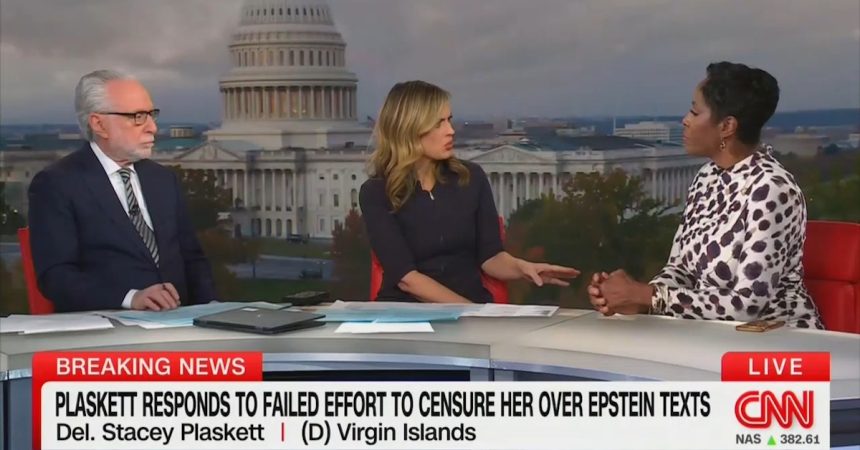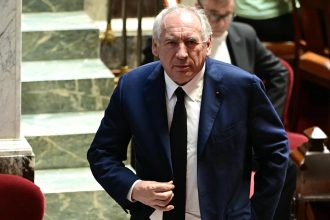STACEY PLASKETT: I have spoken with him about issues that are relevant, things that are going on in the Virgin Islands and elsewhere around the country.
PAMELA BROWN: Right, but on that day that we’re talking about, you initiated the text exchange at 7:55 in the morning. So why were you even texting with Epstein at the time? He was a a known sex offender then.
PLASKETT: Sure. You know, I explained to people I’ve been a prosecutor for many years and there are a lot of people who have information that are not your friends that you use to get information for to get at the truth. This was seven years ago, and people need to understand this was a huge hearing that was taking place with Michael Cohen finally coming forward to talk about monies that he had with the hush money, potential hush money, that had been paid to Stormy Daniels to keep her quiet about the allegations against Trump. We were entering a hearing, lots of people were texting me, lots of people were giving me information, and I find it really interesting and almost rich that The Washington Post took 30 seconds, one set of question line that I did, and said that Epstein was directing me as to what to question Michael Cohen. I have five minutes of questioning. I had a lot of questions, 20 years of experience that I had at the time along with other information I was getting from many sources about issues that should have been raised. And I also want to say that the issues that I raised in that hearing related to individuals who were closest to the president and who could know about money has never been looked into.
BROWN: Right, and we have the full transcript right here. No doubt you have an impressive resume. You’re a former federal prosecutor, you were an impeachment manager. But yes or no, if Epstein had not brought up Rhona to you in that text, would you have asked Michael Cohen about her independently?
PLASKETT: Probably not. I asked about three other individuals as well. Everyone knew other people knew that this woman had been the president’s assistant. I talked about other individuals who were also close to him that other people had given me information about that I had found other information about. And there were other issues that I talked with him about as well, Michael Cohen that I brought up during that time. So, as a prosecutor, as an investigator, you glean information, get information where you can. Some of it is relevant, some of it is not, and you put it all together and you ask the question.
BROWN: You’re saying look, he was a constituent, right? And whether or not they’re good or bad, you’re just trying to get information to get to the truth. But at this time, this was happening after he had already pleaded guilty to state prostitution charges. And then there was that Miami Herald article that came out in 2018 detailing how widespread the sexual abuse was, interviewing 80 women who said that he sexually abused them, I should say. So I’m wondering as you look back, do you think that it was an error in judgment to be communicating with him at all? Do you have any regrets?
PLASKETT: Well, listen, I think Jeffrey Epstein is a reprehensible person. Absolutely disgusting. I lived in a house during childhood with a mother who had been sexually abused by her dad. And I know the effect that had on her, as well as us as her family. And so I understand what the victims are going through, and I want them to get their relevant — their justice, their peace out of this. I believe that Jeffrey Epstein had information, and I was gonna get information to get at the truth. Having a friendship with him is not something that I would would deem to have. And so I’m just looking forward — I’m moving forward. And I think that that’s what we as American people should do is move forward. If individuals are not involved in illegal activity, extending his criminal enterprise or his financial enterprise or all of those things, I think that we need to look at what people are doing moving forward.
BROWN: Wait… He was a known sex offender and it had been detailed, all the sexual abuse.
PLASKETT: There are a lot of people who have done a lot of crimes, and as a prosecutor, you get information from people where you can. I’ve interviewed confidential informants, I’ve interviewed narcotics, drug traffickers and others, and that doesn’t mean that I’m their friend. That doesn’t mean that they are friendly with me. It means that they have information that I need and that I’m trying to get at the truth, and that’s what I do.
BROWN: So no regrets, basically, is what you’re saying?
PLASKETT: I’m moving forward.









